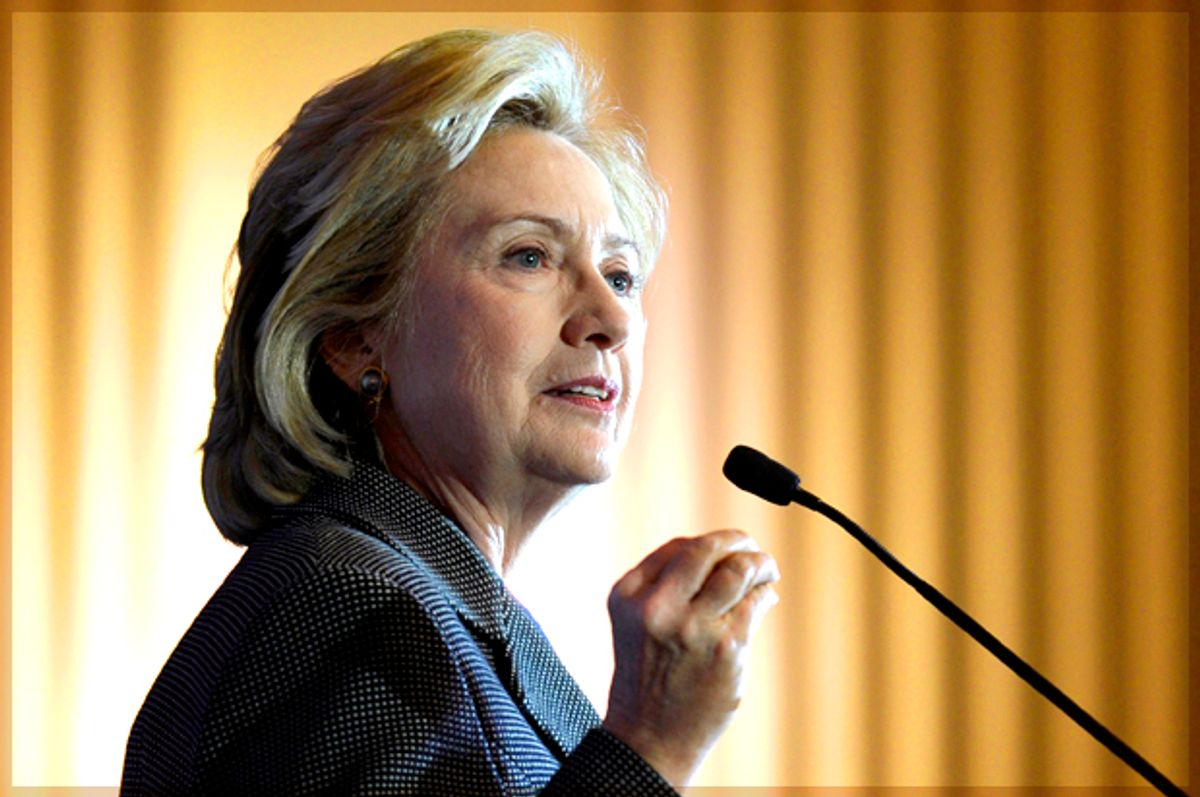On Monday evening, it seemed a safe bet that Israeli Prime Minister Benjamin Netanyahu's address before Congress would dominate Tuesday's political discussion. Netanyahu's speech still promises to receive prominent play, but the prime minister now has competition: Late last night, the New York Times revealed that during her four-year tenure as secretary of state, Hillary Clinton used only a private email account to conduct official business, a possible violation of federal record-keeping rules that require officials to preserve their correspondence. As the Times' Michael Schmidt wrote, Clinton's practices underscored lingering concerns about the Clintons' "lack of transparency and inclination toward secrecy."
Schmidt's report also lays bare Clinton's hypocrisy on those scores.
As the nation's top diplomat, Clinton was the Obama administration's leading crusader against foreign governmental corruption and secrecy, arguing that societies stood to gain from a commitment to openness and transparency. Months after she was sworn in as secretary in 2009, Clinton took that fight to Angola, where many opposition activists and politicians hoped she would speak out against President José Eduardo dos Santos' autocratic rule. Clinton didn't directly criticize Santos, but she didn't ignore his abuses of power, either. Speaking before members of parliament in Luanda, the capital, Clinton challenged the assembled lawmakers: "In a democracy such as yours, the parliament must demand accountability and transparency, and stand against financial corruption and abuse of power."
Three years later, as she neared the end of her Foggy Bottom tenure, Clinton hailed the Open Government Partnership, a nascent international effort to combat corruption, promote accountability, and ensure transparency in governance. “The cure for corruption is openness,” Clinton declared at the coalition's April 2012 conference in Brazil. Later in the speech, Clinton added, “I’ve seen how technology is transforming the way that we and other nations do diplomacy and development. ... But of course, technology isn’t some kind of magic wand. Ultimately, it is political will that determines whether or not we hold ourselves accountable.”
As part of her anti-corruption pitch, Clinton occasionally eschewed moralistic language and instead framed transparency in terms of self-interest -- as a story she related during her 2012 speech before the Clinton Global Initiative illustrates.
"I just met in the last few days with the new president of a country who is trying to tackle corruption," Clinton told the audience, "and I said, 'Well, I have here a lot of the international lists of where your country stands on business climate, on corruption, on government transparency, and you are near or at the bottom. And it is time for you to recognize that in an interconnected global economy, you will benefit from doing what you should be doing internally for yourself.' And so we have to have that kind of hard talk, which we do on a regular basis."
Clinton was so fervent an advocate for transparency that in March 2012, she received Transparency International-USA's Integrity Award "for her work in promoting transparency and integrity worldwide," citing measures against bribery and for accountability in foreign aid.
But while Clinton lectured other governments and received accolades for championing transparency and accountability, she undermined those principles at home. The Federal Records Act required Clinton to have her emails "preserved on department servers," as Schmidt notes. But her aides "took no action" to adhere to this requirement.
Clinton apologists will undoubtedly seize on the sheer number of emails her team has since handed over to the State Department. All told, Clinton aides have given the department 55,000 pages of emails. Nothing more to see here!
If only. Clinton's team only submitted those emails to the department after State requested them two months ago in accordance with record-keeping rules -- and after the aides personally decided which emails to send to the department.
We're supposed to be impressed that Clinton's aides didn't wholly flout a request to comply with federal rules -- and we should blindly trust that her Yes Men and Women did not withhold any embarrassing or politically inexpedient correspondence? Please.



Shares